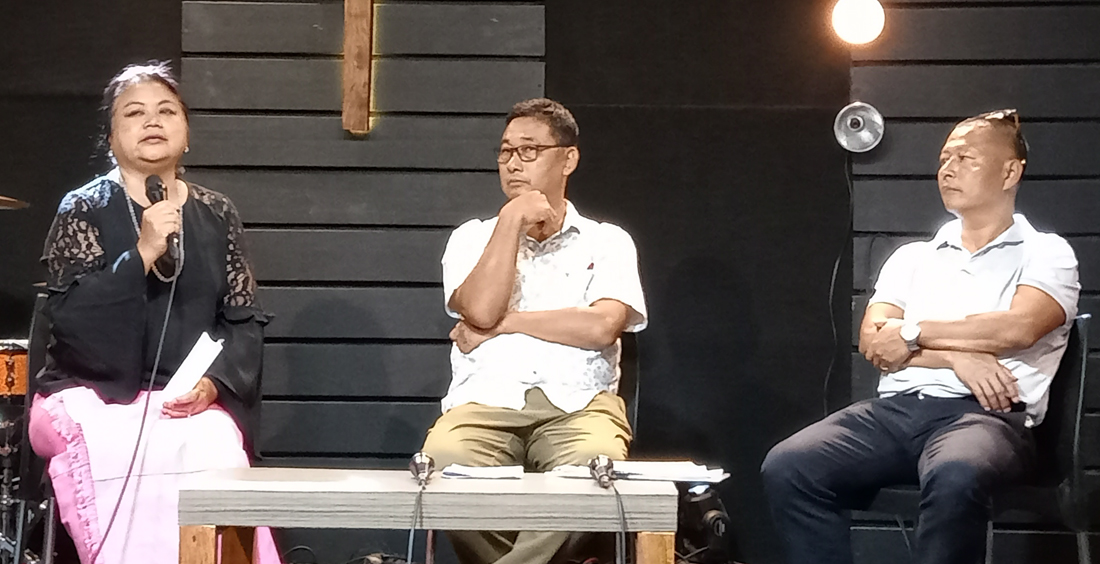Share

Our Reporter
Dimapur, Sep.29 (EMN): Senior journalist, Bano Haralu, on Thursday asserted that public leaders can make governments and institutions act effectively in public interest; guide and focus on the disadvantaged groups so that they have a fair chance to succeed.
‘When we look around there is definitely a great potential for improving the quality of our lives and this all falls in the domain of public leaders and their commitment. We can debate and suggest ways and means to address these issues of governance and challenges but we must also dwell on the values that public leaders should hold’, she said.
Haralu was speaking during a discourse on ‘Who is a Public Leader’ at the XVI Morung Lecture on Thursday at The Lighthouse Church, Hill View colony, in Dimapur.
She stated that public problems can be changed not only through government actions but also by non-profit and for profit organisations but ‘we all continue to agree that governments are the strongest and most powerful actors in addressing public problems’.
“But how much do we trust our government to address these issues also comes into play when we talk about the role of our public leaders”, she pointed out.
The senior journalist said many public leaders have influence and power to make changes yet have failed their communities by denying basic rights, by reducing economic opportunities and undermining effective governance.
“The public leader seeks to understand how to see the world better and to see geo-political development which changes every day. On the policy side, a public leader is someone who supports enquiry and analysis, and respects the resulting evidence in making decisions. It is not because facts are right or is always right, sometimes facts can be disputed and experts can be wrong because of some analytic error, thinking --conscious or unconscious. The solution is to actually collect more facts and examine the evidence more carefully,” Haralu opined.
On truth and knowledge, she said ‘honesty is a requisite in speaking and writing, and within this honesty is the quality of integrity on what should hold a man or woman even when it is difficult to speak the truth’.
In the state, she wondered how much of people’s opinion goes into the formation of the policies.
‘It is a question of inclusivity, how much do the public leaders today include the people, the populace, the electorate, the village and the entire interest of the people’, she added.
Pangerungba Kechu, professor of Society, Christina Ethics and Contextual Theology at Oriental Theological Seminary, speaking on the perspective of strategy and intervention, said in order to understand who a public leader is, ‘we need to acknowledge that there is a crisis in terms of institution, tribes, individuals and mechanisms.
‘The crisis of leadership that we see today has to be positioned in the context of the larger changes that we are experiencing today.
‘We need to get into analysis to understand who a public leader is. We need leaders who have track records of delivering, who can articulate the multiple lived world of Naga populace. We need leaders who have the commitment to mentor and work as a team as it is important to redefine today the notion of leadership that we have’, he said.
‘Based on the future that we desire, we must create a movement of awareness and education around us which is a long term process’, he asserted while pointing out that given the Naga situation, ‘we need leaders with moral integrity who have the habit of delivering’.
“Nagas have vested too many powers on the leaders and it is time for us to lead and not wait upon the leaders to lead,” he added.
Nagaland Building and Other Construction Workers’ Welfare Board (NBOCWWB) chairman, Dr. Kekhrie Yhome, spoke on the three issues of leadership which includes matheme (mathematics), morphology and matrix of leadership.
The matheme of leadership, he said, is a set theory which questions representation of whole numbers, numerical relations, and concept of multiplicity.
Describing the history of the hero, he said it was the idea of protector, defender, safe-guardian and warrior, which eventually progressed to the television superheroes.
Whereas in the Naga context, a hero was a grand person, someone with a ‘warrior-ness’, which can be based on entitlement that comes from education, a government job or a social recognition, he said.
In the morphology of leadership, he said that changes are inevitable, often invisible and at times radical. There are generation gaps, inter-cultural and emergence of bio politics. In the Naga context of morphology of leadership, he likened it to the modern government system.
The issues, he pointed out, are who owns the community, who runs the government and who leads the Church.
‘Among these issues we find sense, voice, property which also includes populism, regionalism, factionalism, tribalism, legitimacy and trust deficits.
‘In the matrix of leadership, the challenges of leadership are the politics of memory in public life and a public leadership whose mind is no longer young. We need to rebrand leadership, shift from politics of regret and need to move forward with a collective memory for our younger generation’, he added.